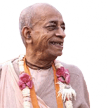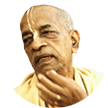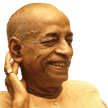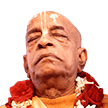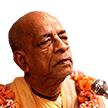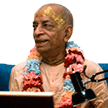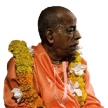Vedic Version - an essential subject: Difference between revisions
(Created page with "Category:Essential Subjects <!----------------------- edit below this line -----------------------> <!------------------------ begin introduction text below --------------...") |
(Vanibot #0041: Moves Choose Another box to the end) |
||
| Line 2: | Line 2: | ||
<!----------------------- edit below this line -----------------------> | <!----------------------- edit below this line -----------------------> | ||
<!------------------------ begin introduction text below ------------------------> | <!------------------------ begin introduction text below ------------------------> | ||
Māyāvādī philosophers generally speculate about spiritual matters and preach un-authoritative subjects which deviate from the Vedas. However, an intelligent person will not speak anything without authoritative support from the scriptures as they are bonafide sources. The Vedic version of knowledge and wisdom provide accurate details and descriptions in every matter and aspect in this creation, so there is no need to misguide oneself by listening to Māyāvādī philosophers. The evidence given in the Vedic version of matters must be taken as foremost as it is regarded as first class evidence. It is the most perfect source. | |||
Srila Prabhupada's books, lectures, conversations and letters offer a comprehensive presentation of this essential subject as seen in the Vaniquotes '''[[Vaniquotes:Category:Vedic Version|Vedic Version]]''' category. An introduction from his books is given below in the following | Srila Prabhupada's books, lectures, conversations and letters offer a comprehensive presentation of this essential subject as seen in the Vaniquotes '''[[Vaniquotes:Category:Vedic Version|Vedic Version]]''' category. An introduction from his books is given below in the following 16 quotes. | ||
<!-------- end introduction text and don't touch next three lines ---------> | <!-------- end introduction text and don't touch next three lines ---------> | ||
== Quotes from Srila Prabhupada's books == | == Quotes from Srila Prabhupada's books == | ||
<!----------------- edit quote boxes below this line -----------------> | <!----------------- edit quote boxes below this line -----------------> | ||
{{VaniQuotebox| | {{VaniQuotebox|According to the Vedic version, a Vaisnava is never to be considered an abrahmana, or non-brahmana. A Vaisnava should not be thought to belong to a lower caste even if born in a mleccha or yavana family|According to the Vedic version, a Vaiṣṇava is never to be considered an abrāhmaṇa, or non-brāhmaṇa. A Vaiṣṇava should not be thought to belong to a lower caste even if born in a mleccha or yavana family. Because he has become a devotee of Lord Kṛṣṇa, he has become purified and has attained the stage of brāhmaṇa (dvijatvaṁ jāyate nṛṇām). '''(Caitanya-caritāmṛta, Antya-līlā 16.29)'''}} | ||
{{VaniQuotebox| | {{VaniQuotebox|According to the Vedic version there is no existence beyond Brahman. Sarvam khalv idam brahma|According to the Vedic version there is no existence beyond Brahman. Sarvaṁ khalv idaṁ brahma (Chāndogya Upaniṣad 3.14.1). It is stated also in the Viṣṇu Purāṇa that whatever we see is parasya brahmaṇaḥ śaktiḥ; everything is an expansion of the energy of the Supreme Absolute Truth, Brahman. '''(Śrīmad-Bhāgavatam 3.26.15)'''}} | ||
{{VaniQuotebox| | {{VaniQuotebox|According to the Vedic version, before the creation this world had no existence, and after dissolution the world will no longer be manifested|According to the Vedic version, before the creation this world had no existence, and after dissolution the world will no longer be manifested. Voidists also take advantage of this Vedic version and conclude that the cause of this material world is void. But the Vedic injunctions do not say that it is void. The Vedic injunctions define the source of creation and dissolution as yato vā imāni bhūtāni jāyante, "He from whom this cosmic manifestation has emanated and in whom, after annihilation, everything will merge." '''(Kṛṣṇa Book, Chapter 87)'''}} | ||
{{VaniQuotebox| | {{VaniQuotebox|As stated in the Vedic versions, the Supreme Personality of Godhead has multipotencies. According to expert opinion, Kubja represents the bhu-sakti potency of Krsna, just as Srimati Radharani represents His cit-sakti potency|As stated in the Vedic versions, the Supreme Personality of Godhead has multipotencies. According to expert opinion, Kubjā represents the bhū-śakti potency of Kṛṣṇa, just as Śrīmatī Rādhārāṇī represents His cit-śakti potency. Although Kubjā requested Kṛṣṇa to remain with her for some days, Kṛṣṇa politely impressed upon her that it was not possible for Him to stay. Kṛṣṇa visits this material world occasionally, whereas His connection with the spiritual world is eternal. '''(Kṛṣṇa Book, Chapter 48)'''}} | ||
{{VaniQuotebox| | {{VaniQuotebox|A genuine brahmana or Vaisnava therefore depends eternally on the conclusion of the Vedas or Vedic versions presented by the Supreme Personality of Godhead Himself|Anyone who is a sincere devotee of Lord Kṛṣṇa and who preaches this cult, speaking only on the basis of Kṛṣṇa's instructions, is understood to be virajam, or free from the defects of material contamination. A genuine brāhmaṇa or Vaiṣṇava therefore depends eternally on the conclusion of the Vedas or Vedic versions presented by the Supreme Personality of Godhead Himself. Only from Vedic knowledge can we understand the actual position of the Absolute Truth, who, as described in Śrīmad-Bhāgavatam. '''(Śrīmad-Bhāgavatam 4.21.42)'''}} | ||
{{VaniQuotebox| | {{VaniQuotebox|For a materialistic person, the completely spiritual body is inconceivable. We have to accept the version of the Vedas when our experimental perception cannot understand a subject|For a materialistic person, the completely spiritual body is inconceivable. We have to accept the version of the Vedas when our experimental perception cannot understand a subject. As stated in Brahma-saṁhitā: īśvaraḥ paramaḥ kṛṣṇaḥ sac-cid-ānanda-vigrahaḥ (Bs. 5.1). The Supreme Lord has a body with form, but that body is not composed of material elements. It is made of spiritual bliss, eternity and living force. '''(Śrīmad-Bhāgavatam 5.5.19)'''}} | ||
{{VaniQuotebox| | {{VaniQuotebox|If the individual soul were not controlled by the Supersoul, then how could one explain the Vedic version that a living entity transmigrates from one body to another and enjoys or suffers the effects of his past deeds?|If the individual soul were not controlled by the Supersoul, then how could one explain the Vedic version that a living entity transmigrates from one body to another and enjoys or suffers the effects of his past deeds, sometimes being promoted to a higher standard of life and sometimes being degraded to a lower standard? Thus the conditioned souls are not only under the control of the Supreme Lord but are also conditioned by the control of the material nature. '''(Kṛṣṇa Book, Chapter 87)'''}} | ||
{{VaniQuotebox| | {{VaniQuotebox|If we want to interpret the Vedic version, we must imagine an interpretation according to what we want to do. We set forth such an interpretation as a suggestion or hypothesis. As such, it is not actually true, and the self-evident proof is lost|Out of four main types of evidence—direct perception, hypothesis, historical reference and the Vedas—Vedic evidence is accepted as the foremost. If we want to interpret the Vedic version, we must imagine an interpretation according to what we want to do. First of all, we set forth such an interpretation as a suggestion or hypothesis. As such, it is not actually true, and the self-evident proof is lost. '''(Caitanya-caritāmṛta, Madhya-līlā 6.137)'''}} | ||
{{VaniQuotebox|Since a perfectly advanced spiritualist never says anything false, all his words are reasonable and agree with the Vedic version. A highly realized person never says anything that has no meaning|Since a perfectly advanced spiritualist never says anything false, all his words are reasonable and agree with the Vedic version. A highly realized person never says anything that has no meaning. Māyāvādī philosophers claim to be the Supreme Personality of Godhead, and this has no meaning, but Śrī Caitanya Mahāprabhu never uttered such nonsense. '''(Caitanya-caritāmṛta, Ādi-līlā 7.105)'''}} | |||
{{VaniQuotebox|The chronological order in which people all over the world refer to the days of the week - Sunday, Monday, Tuesday, Wednesday, Thursday, Friday and Saturday - corresponds to the Vedic order of the planets and thus circumstantiates the Vedic version|According to the Vedic version, the modern astronomer's proposition that the moon is nearest to the earth should not be accepted. The chronological order in which people all over the world refer to the days of the week—Sunday, Monday, Tuesday, Wednesday, Thursday, Friday and Saturday—corresponds to the Vedic order of the planets and thus circumstantiates the Vedic version. '''(Śrīmad-Bhāgavatam 8.18.5)'''}} | |||
{{VaniQuotebox|The Vedic version that the whole cosmic creation is nothing but Brahman means that since everything is emanating from the Supreme Brahman, nothing is apart from Him|The Vedic version that the whole cosmic creation is nothing but Brahman means that since everything is emanating from the Supreme Brahman, nothing is apart from Him. Similarly, the part-and-parcel hands and legs are called the body, but the body as the whole unit is neither the hands nor the legs. The Lord is the transcendental form of eternity, cognition and beauty. And thus the creation of the energy of the Lord appears to be partially eternal, full of knowledge and beautiful also. '''(Śrīmad-Bhāgavatam 1.5.20)'''}} | |||
{{VaniQuotebox|The entire cosmos is created by Durga in cooperation with Lord Visnu in the form of kala, time. Sa iksata lokan nu srja. Sa imal lokan asrjata. This is the version of the Vedas|The entire cosmos is created by Durgā in cooperation with Lord Viṣṇu in the form of kāla, time. Sa īkṣata lokān nu sṛjā. Sa imāḻ lokān asṛjata. This is the version of the Vedas (Aitareya Upaniṣad 1.1.1-2). Māyā happens to be the wife of Lord Śiva, and thus Lord Śiva is in association with māyā, but Lord Viṣṇu here assures Lord Śiva that this māyā will no longer be able to captivate him. '''(Śrīmad-Bhāgavatam 8.12.40)'''}} | |||
{{VaniQuotebox|The gross materialist, however, without any faith in the Vedic version, remains eternally in darkness, driven by a false conviction on the basis of imperfect experimental knowledge, or so-called material science|The worshipers of the demigods have one facility more than the unbelievers due to their being convinced of the Vedic version, by which they can get information of the benefit of worshiping the Supreme Lord in the association of the devotees of the Lord. The gross materialist, however, without any faith in the Vedic version, remains eternally in darkness, driven by a false conviction on the basis of imperfect experimental knowledge, or so-called material science, which can never reach into the realm of transcendental knowledge. '''(Śrīmad-Bhāgavatam 2.3.11)'''}} | |||
{{VaniQuotebox|The Lord is one and that He is expanded in everything. This is understood by the Vedic version: sarvam khalv idam brahma. One who knows this concentrates all his energy in worshiping Lord Visnu|Only the devotees know perfectly that the Supreme Personality of Godhead, Viṣṇu, is all-pervading. Within the material energy, He is represented by the five material elements as well as the mind, intelligence and ego. He is also represented by another energy—the living entities—and all these manifestations in the spiritual and material world combined are but representations of the different energies of the Lord. The conclusion is that the Lord is one and that He is expanded in everything. This is understood by the Vedic version: sarvaṁ khalv idaṁ brahma. One who knows this concentrates all his energy in worshiping Lord Viṣṇu. '''(Śrīmad-Bhāgavatam 4.24.62)'''}} | |||
{{VaniQuotebox|We have to hear about God, Krsna, from the authentic Vedic literature and from persons who understand the Vedic version properly|We have to hear about God, Kṛṣṇa, from the authentic Vedic literature and from persons who understand the Vedic version properly. Even though Brahmā had not seen the Supreme Personality of Godhead before, he was confident that the Lord was there in Śvetadvīpa. Thus he took the opportunity to go there and offer prayers to the Lord. '''(Śrīmad-Bhāgavatam 8.5.25)'''}} | |||
{{VaniQuotebox|We hear from the Vedic version that the Supreme Brahman exhibits His effulgence and therefore everything becomes illuminated|We hear from the Vedic version that the Supreme Brahman exhibits His effulgence and therefore everything becomes illuminated. We can understand from the Brahma-saṁhitā that the brahma-jyotir, or the Brahman effulgence, emanates from the body of the Supreme Lord. And from the Brahman effulgence, all creation takes place. It is also stated in the Bhagavad-gītā that the Lord is the support of the Brahman effulgence. Therefore, originally He is the root cause of everything. '''(Kṛṣṇa Book, Chapter 3)'''}} | |||
<!----------------- edit quote boxes above this line -----------------> | <!----------------- edit quote boxes above this line -----------------> | ||
| Line 30: | Line 46: | ||
'''Vedic Version - [[Vaniquotes:Category:Vedic Version|explore more within this category]]'''. | '''Vedic Version - [[Vaniquotes:Category:Vedic Version|explore more within this category]]'''. | ||
{{EsentialSubjectTotal}} | {{EsentialSubjectTotal}} | ||
<div style="float:left;"> | |||
{{EssentialSubjectnav}} | |||
</div> | |||
__NOTOC__ | __NOTOC__ | ||
__NOEDITSECTION__ | __NOEDITSECTION__ | ||
Latest revision as of 18:08, 22 November 2020
Māyāvādī philosophers generally speculate about spiritual matters and preach un-authoritative subjects which deviate from the Vedas. However, an intelligent person will not speak anything without authoritative support from the scriptures as they are bonafide sources. The Vedic version of knowledge and wisdom provide accurate details and descriptions in every matter and aspect in this creation, so there is no need to misguide oneself by listening to Māyāvādī philosophers. The evidence given in the Vedic version of matters must be taken as foremost as it is regarded as first class evidence. It is the most perfect source.
Srila Prabhupada's books, lectures, conversations and letters offer a comprehensive presentation of this essential subject as seen in the Vaniquotes Vedic Version category. An introduction from his books is given below in the following 16 quotes.
Quotes from Srila Prabhupada's books
Vedic Version - explore more within this category.
Vanipedia has now over 903 introductory articles compiled from Srila Prabhupada's books under the series titled Essential Subjects. All these articles can be seen in the Table of Content on the right side of this article and also here in this Umbrella Category. Browse through them to relish the breadth and depth of Srila Prabhupada's teachings - There is a subject for everyone.

